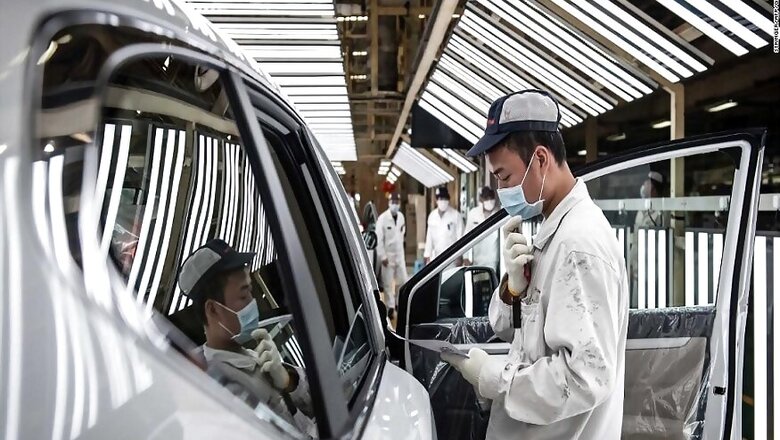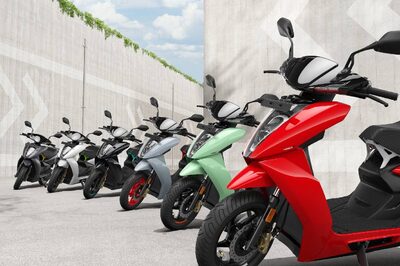
views
In a normal year, China would have sold more than 6 million new cars by now. This year, the number is closer to 3.7 million, and now the government is handing out cash to help the world's biggest auto market get back on its feet after the coronavirus pandemic.
Car sales declined 42% in the first quarter of 2020 compared to last year, according to data released late last week by the China Association of Automobile Manufacturers (CAAM). While that is largely because of a whopping 79% plunge in February — when the country of 1.4 billion people recorded just 310,000 sales — the market remains very weak. Only 1.43 million vehicles were sold in China last month, a 43% decline over March 2019.
The auto industry plays a crucial role in China's economy. More than 40 million people in the country rely on the sector for jobs, either directly or indirectly. The industry generates more than $1 trillion in revenue each year, roughly 10% of China's manufacturing output.
A healthy Chinese car market is also important to the rest of the world. Global automakers like Volkswagen and General Motors sell millions of cars in China — each of those companies, for example, depend on the country for roughly 40% of their total sales.
Returning to anything resembling normality, though, will be difficult for China. The economy is still trying to rebound after the government attempted to quash the coronavirus outbreak by placing entire cities on lockdown and restricting travel. Auto manufacturing stalled as the measures forced factories to close and snarled supply chains. Much of the world is also still under lockdown, complicating the recovery.
Car production, at least, has started to resume in China: Even Wuhan, the original epicenter of the virus and a major hub for the global auto industry, ended its 76-day lockdown last week.
But getting consumers to buy new cars again is harder, and made even more challenging by the fact that consumer demand was already slowing significantly before the virus hit. Total car sales in China fell about 8% in 2019 to just under 25.8 million after having slid nearly 3% in 2018 — the first contraction since the 1990s.
"While the supply chain disruption by coronavirus is surely a headache for auto makers, plummeting demand could be even more life-threatening after two consecutive years of sales contraction in China," wrote Alicia García-Herrero, chief Asia Pacific economist at Natixis, in a recent research note.
García-Herrero added in an interview with CNN Business that the 43% drop in March, while an improvement over February, was still "massive," especially given the slowdown that was already underway.
'Urgent need' to boost sales
China knows it has a demand problem on its hands. CAAM said in a statement Friday that as automakers restart production, boosting sales is now the industry's "primary issue" and an "urgent need."
While the car market may rebound in the second quarter, it's unlikely that China will be able to make up for its losses in the first quarter, CAAM added.
The industry association did not release a new forecast for sales this year. Before the outbreak, it predicted a 2% drop in 2020. Recent independent estimates, though, have been severe: China's auto sales could decline by as much as 10% this year, according to an analysis S&P Ratings published last week.
China is taking steps to try to shore up sales. Beijing last month announced that it would extend subsidies and tax breaks for new energy vehicles, such as electric or plug-in hybrid cars, for another two years.
The country had begun dramatically cutting those incentives last year in order to weed out underperforming companies. But electric vehicles have suffered more than the broader market. Last month, only 53,000 such cars were sold, a 53% drop compared to a year earlier. (That amount, though, excludes Tesla, the American automaker that has lately been pushing hard for Chinese customers.)
Local governments are also stepping in. At least a dozen cities or provinces have encouraged people to buy cars, mainly by offering cash subsidies of as much as $1,400 (Rs 1.07 lakh) per vehicle.
The country is likely hoping that demand will return as schools reopen this spring and the summer season approaches, too. The need to drive children to and from school is a big reason why people in China buy cars, according to the China Passenger Car Association (CPCA), another trade group.
CPCA Secretary General Cui Dongshu also noted earlier this month that China's Labor Day holiday in May will last five days this year, longer than it has been in more than a decade. He's hoping the desire to travel over a long holiday could boost sales.
Less money to spare
Handing out cash and hoping drivers return to the roads, though, isn't going to be enough to save China's sagging car market.
The explosive sales growth that defined China's car market in the 1990s is long gone. And García-Herrero noted in her research report that the purchasing power of Chinese consumers has been weakening, creating an underlying structural problem that could plague sales for a long time to come.
The ensuing lack of demand for cars — and other big-ticket items — can be attributed to a host of problems that have bedeviled China's economy in recent years. García-Herrero pointed, for example, to rising housing costs that have reduced the amount of money that Chinese consumers can set aside for other purchases.
A widening gap between the rich and the poor has also caused disposable income to stagnate, she added, which particularly hurts sales of more affordable vehicles. And tough regulatory restrictions for banks that were rolled out in 2017 made it more difficult for people to find lenders to finance their car purchases.




















Comments
0 comment